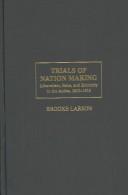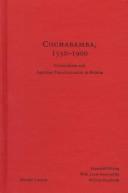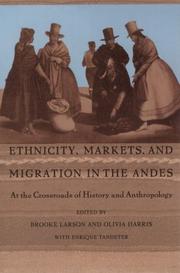| Listing 1 - 10 of 10 |
Sort by
|

ISBN: 9780511616396 9780521561716 9780521567305 0511166133 9780511166136 9780511164187 0511164181 052156171X 0521567300 0511165447 9780511165443 0511616392 128043757X 9781280437571 051116498X 9780511164989 9786610437573 6610437572 1107141966 9781107141964 0511312911 9780511312915 Year: 2004 Publisher: Cambridge, UK ; New York : Cambridge University Press,
Abstract | Keywords | Export | Availability | Bookmark
 Loading...
Loading...Choose an application
- Reference Manager
- EndNote
- RefWorks (Direct export to RefWorks)
This book offers the first interpretive synthesis of the history of Andean peasants and the challenges of nation-making in the four republics of Colombia, Ecuador, Peru, and Bolivia during the turbulent nineteenth century. Nowhere in Latin America were postcolonial transitions more vexed or violent than in the Andes, where communal indigenous roots grew deep and where the 'Indian problem' seemed so daunting to liberalizing states. Brooke Larson paints vivid portraits of Creole ruling élites and native peasantries engaged in ongoing political and moral battles over the rightful place of the Indian majorities in these emerging nation-states. In this story, indigenous people emerge as crucial protagonists through their prosaic struggles for land, community, and 'ethnic' identity, as well as in the upheaval of war, rebellion, and repression in rural society. This book raises broader issues about the interplay of liberalism, racism, and ethnicity in the formation of exclusionary 'republics without citizens'.
Indians of South America --- #SBIB:39A6 --- #SBIB:39A74 --- #SBIB:98G --- American aborigines --- American Indians --- Indigenous peoples --- Government relations --- Etniciteit / Migratiebeleid en -problemen --- Etnografie: Amerika --- Geschiedenis van Latijns-Amerika --- Ethnology --- Andes Region --- Acuerdo de Cartagena countries --- Andean countries --- Andean region --- Politics and government --- Race relations. --- Government relations. --- Arts and Humanities --- History
Digital
ISBN: 9780511616396 Year: 2004 Publisher: Cambridge Cambridge University Press
Abstract | Keywords | Export | Availability | Bookmark
 Loading...
Loading...Choose an application
- Reference Manager
- EndNote
- RefWorks (Direct export to RefWorks)
Japan --- Latin America

ISBN: 0822320614 0822320886 9780822320616 9780822320883 069107738X Year: 1998 Publisher: Durham Duke university press
Abstract | Keywords | Export | Availability | Bookmark
 Loading...
Loading...Choose an application
- Reference Manager
- EndNote
- RefWorks (Direct export to RefWorks)
Agriculture --- Peasants --- Mercantile system --- Economic aspects --- History --- Cochabamba Region (Bolivia) --- Rural conditions --- Politics and government --- History. --- Rural conditions. --- Politics and government. --- Peasantry --- Agricultural laborers --- Rural population --- Marks (Medieval land tenure) --- Villeinage --- Cameralism --- Kameralism --- Mercantilism (Mercantile system) --- Balance of trade --- Economic policy --- Farming --- Husbandry --- Industrial arts --- Life sciences --- Food supply --- Land use, Rural --- Economic aspects&delete& --- Agriculture - Economic aspects - Bolivia - Cochabamba Region - History --- Peasants - Bolivia - Cochabamba Region - History --- Mercantile system - Bolivia - Cochabamba Region - History --- Cochabamba Region (Bolivia) - Rural conditions --- Cochabamba Region (Bolivia) - Politics and government
Book
ISBN: 0822379856 Year: 1998 Publisher: Durham : Duke University Press,
Abstract | Keywords | Export | Availability | Bookmark
 Loading...
Loading...Choose an application
- Reference Manager
- EndNote
- RefWorks (Direct export to RefWorks)
Winner of the 1990 Best Book Award from the New England Council on Latin American StudiesThis study of Bolivia uses Cochabamba as a laboratory to examine the long-term transformation of native Andean society into a vibrant Quechua-Spanish-mestizo region of haciendas and smallholdings, towns and villages, peasant markets and migratory networks caught in the web of Spanish imperial politics and economics. Combining economic, social, and ethnohistory, Brooke Larson shows how the contradictions of class and colonialism eventually gave rise to new peasant, artisan, and laboring groups that challenged the evolving structures of colonial domination. Originally published in 1988, this expanded edition includes a new final chapter that explores the book’s implications for understanding the formation of a distinctive peasant political culture in the Cochabamba valleys over the eighteenth and nineteenth centuries.
Agriculture -- Economic aspects -- Bolivia -- Cochabamba Region -- History. --- Cochabamba Region (Bolivia) -- Politics and government. --- Cochabamba Region (Bolivia) -- Rural conditions. --- Mercantile system -- Bolivia -- Cochabamba Region -- History. --- Peasants -- Bolivia -- Cochabamba Region -- History. --- Agriculture --- Peasants --- Mercantile system --- History --- Economic aspects

ISBN: 0822316331 0822316471 9780822316336 9780822316473 0822379864 1322112495 Year: 1995 Publisher: Durham : Duke University Press,
Abstract | Keywords | Export | Availability | Bookmark
 Loading...
Loading...Choose an application
- Reference Manager
- EndNote
- RefWorks (Direct export to RefWorks)
"Major compilation of historical and anthropological articles focuses on the nature of markets and exchange structures in the Andes. Prominent scholars explore Andean participation in the European market structure, the influence of migration in changing ethnic boundaries and spheres of exchange, and the politics of market exchange during the colonial period. Larson's introduction places articles within the context of Andean economic systems, while Harris concludes with an appreciation of the relationships between mestizo and indigenous ethnic identities in the context of market relations. Both introduction and conclusion lend a greater coherence to this carefully-crafted and monumental volume"--Handbook of Latin American Studies, v. 57.
Ethnohistory --- Indians of South America --- Mercantile system --- Ethnohistoire --- Indiens d'Amérique --- Commerce --- Economic conditions --- Migrations --- History --- Conditions économiques --- Andes Region --- Andes --- Histoire --- Economic History --- Andes region --- Economic history. --- Economic conditions. --- Migrations. --- History. --- Indiens d'Amérique --- Conditions économiques --- Indians of South America - Commerce - Andes Region --- Indians of South America - Andes Region - Economic conditions --- Indians of South America - Andes Region - Migrations --- Ethnohistory - Andes Region --- Mercantile system - Andes Region - History --- Andes Region - Economic conditions --- Andes region - History
Book
ISBN: 0822379864 Year: 1995 Publisher: Durham : Duke University Press,
Abstract | Keywords | Export | Availability | Bookmark
 Loading...
Loading...Choose an application
- Reference Manager
- EndNote
- RefWorks (Direct export to RefWorks)
"Major compilation of historical and anthropological articles focuses on the nature of markets and exchange structures in the Andes. Prominent scholars explore Andean participation in the European market structure, the influence of migration in changing ethnic boundaries and spheres of exchange, and the politics of market exchange during the colonial period. Larson's introduction places articles within the context of Andean economic systems, while Harris concludes with an appreciation of the relationships between mestizo and indigenous ethnic identities in the context of market relations. Both introduction and conclusion lend a greater coherence to this carefully-crafted and monumental volume"--Handbook of Latin American Studies, v. 57.
Indians of South America --- Economic history. --- Ethnohistory --- Mercantile system --- Commerce --- Economic conditions. --- Migrations. --- History. --- Andes Region
Book
ISBN: 3030141403 303014139X Year: 2020 Publisher: Cham : Springer International Publishing : Imprint: Springer,
Abstract | Keywords | Export | Availability | Bookmark
 Loading...
Loading...Choose an application
- Reference Manager
- EndNote
- RefWorks (Direct export to RefWorks)
This book discusses parliamentary oversight and its role in curbing corruption in developing countries. Over the past decade, a growing body of research at the global and regional levels has demonstrated that parliamentary oversight is an important determinant of corruption and that effective oversight of public expenditure is an essential component of national anti-corruption strategies and programs. However, little research has been undertaken at the country level regarding how parliamentary oversight is undertaken, which oversight mechanisms are effective or on how national parliaments interact with other anti-corruption stakeholders. This book presents the results of a new large-scale, quantitative analysis which identifies the mechanisms through which institutional arrangements impact corruption, specifically through country case studies on the Caribbean region, Ghana, Myanmar, Nigeria, Tanzania, and Uganda. Addressing a gap in scholarly knowledge while presenting practical policy advice for parliaments and for anti-corruption assistance agencies, this book will be of use to scholars interested in development, anti-corruption, public finance, as well as members of parliament, anti-corruption practitioners, and organizations working in parliamentary strengthening.
Political corruption --- Representative government and representation --- Parliamentary government --- Political representation --- Representation --- Self-government --- Constitutional history --- Constitutional law --- Political science --- Democracy --- Elections --- Republics --- Suffrage --- Public policy. --- Political science. --- Political communication. --- Public Policy. --- Governance and Government. --- Political Communication. --- Political communication --- Administration --- Civil government --- Commonwealth, The --- Government --- Political theory --- Political thought --- Politics --- Science, Political --- Social sciences --- State, The
Multi
ISBN: 9783030141400 Year: 2020 Publisher: Cham Springer International Publishing
Abstract | Keywords | Export | Availability | Bookmark
 Loading...
Loading...Choose an application
- Reference Manager
- EndNote
- RefWorks (Direct export to RefWorks)
This book discusses parliamentary oversight and its role in curbing corruption in developing countries. Over the past decade, a growing body of research at the global and regional levels has demonstrated that parliamentary oversight is an important determinant of corruption and that effective oversight of public expenditure is an essential component of national anti-corruption strategies and programs. However, little research has been undertaken at the country level regarding how parliamentary oversight is undertaken, which oversight mechanisms are effective or on how national parliaments interact with other anti-corruption stakeholders. This book presents the results of a new large-scale, quantitative analysis which identifies the mechanisms through which institutional arrangements impact corruption, specifically through country case studies on the Caribbean region, Ghana, Myanmar, Nigeria, Tanzania, and Uganda. Addressing a gap in scholarly knowledge while presenting practical policy advice for parliaments and for anti-corruption assistance agencies, this book will be of use to scholars interested in development, anti-corruption, public finance, as well as members of parliament, anti-corruption practitioners, and organizations working in parliamentary strengthening.
Politics --- Economic policy and planning (general) --- Mass communications --- communicatie --- politiek
Book
ISBN: 9783030141400 Year: 2020 Publisher: Cham Springer International Publishing :Imprint: Springer
Abstract | Keywords | Export | Availability | Bookmark
 Loading...
Loading...Choose an application
- Reference Manager
- EndNote
- RefWorks (Direct export to RefWorks)
Politics --- Economic policy and planning (general) --- Mass communications --- communicatie --- politiek
Book

ISBN: 9990501319 2821844239 Year: 2015 Publisher: Lima : Institut français d’études andines,
Abstract | Keywords | Export | Availability | Bookmark
 Loading...
Loading...Choose an application
- Reference Manager
- EndNote
- RefWorks (Direct export to RefWorks)
La presente publicación concentra los trabajos presentados por investigadores nacionales y extranjeros en el "Il Encuentro Internacional de Historia. El siglo XX en Bolivia y América Latina. Visiones de fin de siglo", que se realizó en la ciudad de Cochabamba entre el 27 y el 31 de julio de 1998. El encuentro fue organizado por la "Coordinadora de Historia. Investigadores Asociados" y contó con el auspicio del Centro Cultural Portales con sede en esa ciudad, así como con el apoyo de las siguientes instituciones: Facultad de Humanidades de la Universidad Mayor de San Andrés de La Paz, Plural Editores, Anden Silver Corporation, Embajada de México, Lloyl Aéreo Boliviano, Compañía Industrial de Tabacos S.A., Banco Mercantil y La Estrella. La Coordinadora de Historia, que reúne a más de 20 historiadores/as bolivianos/as, desarrolló en 1994 un encuentro similar sobre el siglo XIX en la ciudad de Sucre. Las actas del mismo, al que asistieron renombrados historiadores de Europa, Estados Unidos, Latinoamérica y Bolivia, ya han sido publicadas. En esta oportunidad, 48 expositores abordaron las siguientes temáticas planteadas por los organizadores del Congreso: - Archivos documentales bolivianos del siglo XX. - Proyectos y modelos de sociedad en Bolivia. - Estructuras y practicas políticas en Bolivia y America Latina. - Proyectos, estructuras y modelos económicos en Bolivia y América Latina. - Movimientos, actores y estructuras sociales en Bolivia y America Latina. - Culturas hegemónicas y contraculturas en Bolivia y America Latina. Diez de ellos, Horacio Cerruti, Francisco Zapata, Antonio García de Léon, Antonio Mitre, Melvin Burke, H.C.F, Mansilla, Janvier Sanjinés, Jorge Lazarte, René Antonio Mayorga y Gonzalo Sánchez de Lozada, estuvieron encargados de desarrollar "ponencias magistrales", las que se caracterizaron por intentar visiones más globales o de síntesis sobre las temáticas generales trabajadas en cada una de las jornadas. El encuentro sobre el siglo XX, tuvo la…
Bolivia --- Latin America --- History --- Bolivie --- société --- nationalisme --- politique gouvernementale --- démocratie --- histoire --- économie --- développement --- culture --- cultura --- democracia --- desarrollo --- economía --- historia --- nacionalismo --- política gubernamental --- sociedad
| Listing 1 - 10 of 10 |
Sort by
|

 Search
Search Feedback
Feedback About UniCat
About UniCat  Help
Help News
News